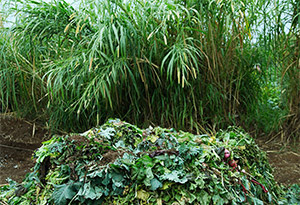4 Tips for the Most Fertile Soil
The key to a bountiful garden is giving back to the land.

Photo: Chris Craymer
Don't let the beautiful pictures fool you. The real treasure of Oprah's farm isn't her luscious kale—it's her dirt. "When we decided to do the farm, we assumed the soil was rich and healthy," says Bob Greene. "But we had it tested and learned it wasn't as full of nutrients as we'd thought. We needed to address that, because rich, fertile soil helps the plants give you the nutrients you need to thrive."
With help from sustainable development company Bio-Logical Capital, the farm's team focused soley on soil improvement before planting the first crops. "We actively returned nutrients to the ground," says Bio-Logical Capital's senior vice president, Guy H. Kaulukukui. We asked Kaulukukui and Greene to explain what it took to return the land to its full fertile potential:
Natural fertilizers work best.
Edible scraps from fruits and vegetables are central to organic farming, says Kaulukukui, because the more nutrients there are in the food by-product, the more potent the compost. Another favorite source of fertilizer on Oprah's farm: the chicken coop. "Fertilizing with manure—whether it's from chickens or cows—is one of the fastest ways to improve soil," says Greene. At the start of each season, they spread a thick layer of compost on the soil, says Kaulukukui, and add more if any of the beds start looking unhealthy.
Anything green gets recycled.
"Organic material is gold," says Greene. "Leaves, plant clippings and grass clippings can help feed the land. That's why we grind everything up and mix it with the soil. The smaller the pieces, the quicker they decompose and release their nutrients back into the ground."
"Cover crops" prime the land.
Coupled with compost, cover crops—including buckwheat, cowpeas, and clovers—help keep weeds at bay, prevent erosion and can reintroduce nutrients into depleted soil in advance of more diverse planting. These early crops were key to rehabilitating Oprah's soil and producing the volume and diversity you see on these pages.
Plant rotation confuses pests.
To avoid damaging the soil by overtreating it with pesticides, Oprah's team relies on a simple trick: Never plant the same crop in the same spot two seasons in a row. This forces insects to work harder to find the crops they like—and, says Kaulukukui, enhances the overall health of the farm.
More on Gardening
With help from sustainable development company Bio-Logical Capital, the farm's team focused soley on soil improvement before planting the first crops. "We actively returned nutrients to the ground," says Bio-Logical Capital's senior vice president, Guy H. Kaulukukui. We asked Kaulukukui and Greene to explain what it took to return the land to its full fertile potential:
Natural fertilizers work best.
Edible scraps from fruits and vegetables are central to organic farming, says Kaulukukui, because the more nutrients there are in the food by-product, the more potent the compost. Another favorite source of fertilizer on Oprah's farm: the chicken coop. "Fertilizing with manure—whether it's from chickens or cows—is one of the fastest ways to improve soil," says Greene. At the start of each season, they spread a thick layer of compost on the soil, says Kaulukukui, and add more if any of the beds start looking unhealthy.
Anything green gets recycled.
"Organic material is gold," says Greene. "Leaves, plant clippings and grass clippings can help feed the land. That's why we grind everything up and mix it with the soil. The smaller the pieces, the quicker they decompose and release their nutrients back into the ground."
"Cover crops" prime the land.
Coupled with compost, cover crops—including buckwheat, cowpeas, and clovers—help keep weeds at bay, prevent erosion and can reintroduce nutrients into depleted soil in advance of more diverse planting. These early crops were key to rehabilitating Oprah's soil and producing the volume and diversity you see on these pages.
Plant rotation confuses pests.
To avoid damaging the soil by overtreating it with pesticides, Oprah's team relies on a simple trick: Never plant the same crop in the same spot two seasons in a row. This forces insects to work harder to find the crops they like—and, says Kaulukukui, enhances the overall health of the farm.
More on Gardening



